|
KEEP THIS NEWSLETTER ALIVE! Shop Online at https://www.irishnation.com |
|||
Stunning Hand-Painted 'Made in Ireland' Family Crest Plaques
Order from Here |
|||
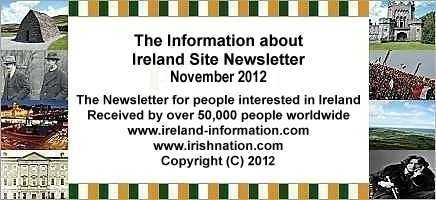
===========
IN THIS ISSUE
===========
=== News Snaps from Ireland
=== New Free Resources at the Site
=== National Museum of Art & History, Dublin
=== Fota Wildlife Park, Cork
=== The Outsider - A Story by Michael Collins
=== The Life and Times of 'The Liberator' by Anthony Lynott
=== YouTube Videos of Irish Interest
=== Clan Gathering Noticeboard
=== Gaelic Phrases of the Month
=== Monthly Free Competition Result
Popular Articles from recent Newsletters:
Bram Stoker: Irish Creator of Dracula
Farmleigh House, Dublin
Dermot and Strongbow & the Invasion of Ireland
Natural Museum of Ireland - Archaeology
==========
FOREWORD
==========
|
Your monthly newsletter will be migrating to a Blog format over the coming months but we will continue to email you the monthly edition too. The advantage of the Blog is that it allows readers to comment easily on the news articles and also be updated on a daily basis if you wish. Happy Thanksgiving to all of our friends in the USA! Michael |

P.S. Please DO FORWARD this Newsletter to a
friend or relative. If you have a website or Facebook
page or Blog (or whatever!) then you can help
us out by putting a link on it to our website:
www.ireland-information.com
Do tell your friends about us as this helps
to keep this newsletter free!
SEND US YOUR PHOTOS OF IRELAND
Got any decent holiday snaps of Ireland - we want them!!
The Information about Ireland Site is compiling a
library of photographs of Ireland and specifically all
of the towns and tourist sites of the country. Photos of
any castle, lake, river, mountain, building, town,
landscape, tourist attraction or historic site are sought.

These photos will be made freely available for anyone
to use in their blogs, school reports, articles,
websites, facebook pages or projects.
Please contact us from here: https://www.irishnation.com/cgi-bin/contactfront.cgi
and we will send you further information. All contributors
will be entered (and re-entered every month) into a monthly
draw for a family crest print for the name of their choosing.
WE NEED YOUR HELP - CONTRIBUTE!
Got something to say? Don't keep it to yourself!
Why don't you submit an article for inclusion
in the next edition? Go here for more information:
https://www.ireland-information.com/newsletter.htm
Do you have access to a website? You can help to
keep this newsletter alive by adding a link to
any of our websites below:
https://www.irishnation.com
http://www.irishsurnames.com
https://www.ireland-information.com
http://www.allfamilycrests.com
http://www.irishpenpals.com
If you have an AOL or HOTMAIL account then you
may get better results by viewing this
newsletter online here:
https://www.ireland-information.com/nov12.htm
The only way that you could have been
subscribed to this newsletter is by filling
out a subscription form at the site whereupon
a confirmation notice would have been issued.
If you wish to unsubscribe then go here:
https://www.ireland-information.com/newsletter.htm
========================
NEWS SNAPS FROM IRELAND
========================
|
REMARKABLE REVERSAL IN FORTUNE IS POSSIBLE FOR FIANNA FAIL The Fianna Fail party that governed while the Irish economy collapsed is showing signs of life. The party was pummeled in the last general election, winning only 20 seats in the Irish parliament (Dail Eireann), having previously held 71 seats. The big winners were Fine Gael and the Labour Party who won an extra 25 and 17 seats respectively, sweeping the two parties into a coalition government on the back of an unprecedented popular mandate. It looked like the end of the road for the once all-powerful Fianna Fail. 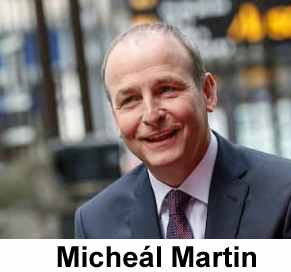
Since that February 2011 election Fianna Fail has struggled to establish the party as even the genuine force of opposition in the parliament, with Sinn Fein repeatedly grabbing the headlines while Fianna Fail licked its wounds. Both government parties rarely missed an opportunity to berate Fianna Fail for the economic mess the country was left in, constantly reminding the media and voters that the problems in the country were all caused by the previous government. It is beginning to look as if that mantra may be wearing a bit thin. Fine Gael and Labour were voted into office in the belief that they would change the way politics in Ireland is conducted. They promised sweeping economic and political reforms with 'burn the bond-holders' the motto of choice for the more militant of Labour supporters (a reference to the fact that Fianna Fail had pledged to repay mostly German and French bondholders in exchange for IMF/EU/ECB funding to keep the country running). 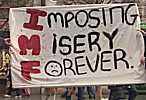
To a large extent the new government has not delivered. Some commentators are pondering just how much longer Fine Gael and Labour can continue to blame Fianna Fail for the rescue plan they implemented in the dying days of their tenure, while at the same time continuing to implement that same plan. Perhaps the government parties felt that there was such public discontent with Fianna Fail that it did not really matter that they were just carrying on the same policies. All that mattered was that they were not Fianna Fail. 
A recent opinion poll should help to focus the mind of those currently in power. Fianna Fail are at 22%, Fine Gael at 30%, Labour at 12%, Sinn Fein at 14% and Independents at 19%. Fianna Fail have risen from 16% in recent months and continue to make ground against the Labour Party who look certain to be severely punished at the next general election. In recent years Sinn Fein have polled well prior to the actual ballot but never quite made the major impact it promised when the votes were counted. If that trend were to continue then the possibility of Fianna Fail being back in government within the next two general elections would be a real possibility - an amazing turnaround by any standard. It is up to the current government and Fine Gael in particular to deliver on their election promises. Blaming Fianna Fail does not seem to be enough for an impatient and suffering Irish public. Comment on this Irish News Story at the Ireland Blog at: https://www.ireland-information.com/blog/?p=99#respond INTERNET USAGE IN IRELAND TO BOOST IRISH ECONOMY A report commissioned by media group UPC has revealed that as much as 6 Billion Euro could be contributed to the Irish economy by 2016, thanks to an increase in ecommerce activity. 2012 is expected to see spending of 3.7 Billion Euro, rising to 5.7 Billion Euro by 2016. This figure would constitute 7% of all consumer spending in Ireland. The report found that Irish adults who shop online spend an average of 116 Euro monthly. 80% of Irish adults now use the internet regularly, up from 50% in 2007. 45% of Irish consumers have made on online purchase in the last year, up from 36% in 2010 and matching the EU average. 
This number compares poorly though with the UK where 71% of consumers made purchases in the previous year. A significant difference between the two markets is that as many as 1 in 5 UK consumers buy their groceries online while in Ireland the figure is 1 in 20. The UK is now the worlds second biggest internet market in terms of sales value and is surely a market that Irish export businesses should be focusing on. The 'State of the Net' publication by the Irish Internet Association has mirrored these findings detailing that there has been an increase of 20% in business marketing budgets being spent on promoting online businesses in Ireland. This compares with an overall 4% decline across other marketing media with newspapers suffering badly. 70% of Irish businesses now have a Facebook presence, 61% are on Twitter while 44% have their own Youtube channel. It has not all been good news for Irish internet businesses though. The Irish Times newspaper recently sold its ireland.com domain name to Tourism Ireland for 495,000 Euro - quite a return on the 3000 Irish punts they reportedly paid for it in the 1990's. Sounds great except that the same Irish Times paid 50 Million euro for myhome.ie at the very height of the property hysteria in Ireland, only to see its value plummet when the property market crashed. The Irish Times was one of the first sites in Ireland to offer paid content with subscribers paying an annual fee to access content not available to unregistered users. As a result of the deal the 15,000 ireland.com customers and email account holders have been unceremoniously ditched. Lets hope they backed up their email. Comment on this Irish News Story at the Ireland Blog at: https://www.ireland-information.com/blog/?p=89#respond ABORTION DEBATE IGNITED BY TRAGIC DEATH IN GALWAY HOSPITAL The death of Savita Halappanavar in Galway University Hospital on October 28th has re-ignited the smoldering abortion debate in Ireland. The 31-year-old woman died after her medically induced miscarriage went wrong and, despite repeatedly asking that the miscarriage be induced further to hasten its completion, it seems that this request may have been denied. The death of Mrs. Halappanavar, who was a native of India, was reported in the 'India Times' newspaper under the headline: 'Ireland Murders Pregnant Indian Dentist'. An investigation into the exact circumstance of her death is under way but regardless of its outcome the divisive issue of abortion is very much back on the Irish agenda. 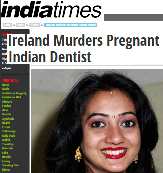
Abortion is as socially divisive in Ireland as it is in most countries. Abortion 'on demand' is illegal in Ireland, resulting in hundreds of women travelling to Britain every year for the procedure. The infamous 'X' case highlighted the inadequacies of Irish law two decades ago, dealing as it did with the issue of a 14-year-old girl who became pregnant after being raped. The Irish Supreme Court has already decided that a termination of a pregnancy is allowable once there is a specific risk to the life of the mother. Despite this successive Irish governments have failed to introduce legislation to clearly define when such abortions are permitted. Medical staff in hospitals are thus operating in a grey legal area with every case having its own unique set of circumstances. It is clear that the Irish government must finally act and introduce legislation immediately so that all parties to the debate know exactly where they stand. It is appalling though that it has taken the death of this woman to put the issue back on the agenda. Comment on this Irish News Story at the Ireland Blog at: https://www.ireland-information.com/blog/?p=79#respond BIG OIL FIND OFF COUNTY KERRY As much as one billion barrels of oil have been discovered off the Kerry coastline in Ireland. Petrel Resources has seen its value quadruple after the announcement. To put the find into context, current world consumption of oil is approximately 80 million barrels daily with Ireland consuming about .165 million barrels daily.  Despite the oil being 200km away from the mainland and under 1km of rock newer drilling techniques have made previously unaccessible oil-fields more viable. The US is expected to become the worlds largest oil producer thanks to its implementation of these new methods.
Exploration licences were sold in recent years to mostly Irish companies as there was little interest from international companies. That looks set to change! The company is now focusing on finding a partner to drill for and transport the oil but in an era of high oil prices it is very optimistic.
Despite the oil being 200km away from the mainland and under 1km of rock newer drilling techniques have made previously unaccessible oil-fields more viable. The US is expected to become the worlds largest oil producer thanks to its implementation of these new methods.
Exploration licences were sold in recent years to mostly Irish companies as there was little interest from international companies. That looks set to change! The company is now focusing on finding a partner to drill for and transport the oil but in an era of high oil prices it is very optimistic.
Comment on this Irish News Story at the Ireland Blog at: https://www.ireland-information.com/blog/?p=63#respond SUGAR TAX TO BE INTRODUCED IN IRELAND The Irish government looks set to follow the lead of several other countries and introduce a tax on sugary soft drinks such as lemonade and cola. It is expected that the tax will be a 10% hike in excise duty which would add about 20 cents to the cost of a 250 cents bottle of soda. The government is torn between wanting to reduce the intake of fattening foods and drinks in the general population while also not wanting to damage employment and add to household bills. 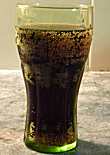
Efforts in Ireland to decrease the consumption of certain products by taxing them have had only limited success. Over the decades there have successive small increases in the price of cigarettes and alcohol. The tax hikes on cigarettes have very much outpaced those on alcohol and certainly do have an effect on consumption, especially when combined with the ban on smoking in the workplace and the current societal disapproval of tobacco. The overall momentum against smoking allowed successive governments to tax cigarettes heavily. The same cannot be said about alcohol consumption. The policy of continually raising the tax on alcohol in small amounts has not had any great effect on consumption. Critics of the policy advocate for a single very large increase in tax on alcohol, perhaps even to increase the price by 50% or 100%, in order to have any kind of real shock impact. The revenue raised from this tax could be used for health education programs and even to fund hospital emergency departments that are inundated with alcohol-related patients every weekend. The need for action in the food and drinks sector is now obvious. 60% of the Irish adult Irish population and nearly 25% of all 7-year-olds are classified as being either overweight or obese. By any measure this is a shocking statistic and is a recipe for a diabetes epidemic in the years to come, along with a whole other raft of health problems. The introduction of a sugar tax on certain flattening products is likely a good idea, but unless it is of a sufficient amount then it seems certain that its impact will be minimal. Comment on this Irish News Story at the Ireland Blog at: https://www.ireland-information.com/blog/?p=71#respond REMEMBRANCE DAY POPPYS - A QUANDARY FOR THE IRISH AND IRELAND The tradition of wearing an artificial red poppy to commemorate soldiers who have died in wartime has existed since 1920 and was inspired by the famous poem ‘In Flanders Field’. The poppy has become an increasingly political symbol in recent years and is especially prominent in the UK where just about every media outlet, political party and sporting occasion promotes its use. So widespread has the use of the poppy become that to not wear one is subtly viewed as somehow being unpatriotic or unwilling to acknowledge the sacrifice of soldiers. Channel 4 television presenter Jon Snow famously labelled the compulsion to wear the poppy as ‘poppy fascism’. 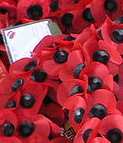
The political correctness surrounding the tradition is so advanced and has accelerated so much in recent years that politicians especially seem to compete with each other to be seen to wear the poppy first. Consequently an event that was intended to raise funds for charity has become an annual photo opportunity in the lead up to November 11th, Armistice day. The tradition has always caused problems in Ireland and Ulster where the British military are reviled by the Catholic population for their part in ‘The Troubles’ and especially for ‘Bloody Sunday’. In Ulster the poppy is seen as a distinct symbol of Britishness and is used almost exclusively by the Unionist community there. The quandary for the Irish is that so many of their relatives served in the British army and served in the first world war with distinction. Given that the initial purpose of the wearing of the poppy was to recognise the sacrifice of those who died in the first world war it can be difficult to refuse what has become an increasing pressure to conform. Not everyone does conform though. Irish soccer player James McClean of Sunderland refused to wear a poppy in a November 2012 Premiership match against Everton. The high-profile event was televised worldwide and regardless of a persons view on the matter it has to be admitted that it took a lot of courage for the 23-year-old McClean not to be bullied into submission. Irish Taoiseach Enda Kenny also did not wear a poppy when attending a Remembrance Sunday service in Enniskillen on the same weekend. What is clear now is that what was intended as an exercise in charity has been taken over by the political and media establishment to the extent that it deeply corrupted. While everyone should be able to celebrate their heritage and history the freedoms that the men and women of the first world war fought for are not at all well served by this turn of events Comment on this Irish News Story at the Ireland Blog at: https://www.ireland-information.com/blog/?p=21#respond |
|
KEEP THIS NEWSLETTER ALIVE! Free Mount with ALL Family Crest Prints, Framed or Unframed 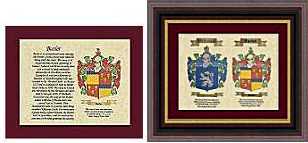
Order from Here |
===============================
NEW FREE RESOURCES AT THE SITE
===============================
IRISH HOLIDAY AND TOURIST FORUM
Post your question about holidaying in Ireland and
we guarantee an answer will be posted on the board:
https://www.ireland-information.com/irishholidays-irishtourist/irishtouristboard.html

NEW COATS OF ARMS ADDED TO THE GALLERY
The following 5 coats of arms images and family
history details have been added to the Gallery:

B: Bird
D: Devlin, Drennan
G: Gibson
R: Rochford
View the Gallery here:
http://www.irishsurnames.com/coatsofarms/gm.htm
THE PERFECT WEDDING, ANNIVERSARY OR BIRTHDAY GIFT!
We now have over 100,000 worldwide names available.
Get the Coat of Arms Print, Claddagh Ring,
Screensaver, Watch, T-Shirt Transfer or Clock for
your name at:
https://www.irishnation.com/familycrestgifts.htm
==========================================
IRELAND'S MOST POPULAR TOURIST ATTRACTIONS
==========================================
|
FREE ATTRACTION #6: NATIONAL MUSEUM OF IRELAND - ART & HISTORY, DUBLIN
The Art & History Museum is located in Collins Barracks on Benburb Street in Dublin City. The Museum houses a vast range of objects including weaponry, furniture, silver, ceramics and glassware and Irish costumes. Permanent exhibitions include 'The Easter Rising Exhibition' and 'Airgead: a thousand years of Irish coins'. The fine exhibition of reconstructed rooms shows how the (better off!) Irish lived over the last few centuries. 
It is possible to walk along the River Liffey quays from O'Connell Bridge to the Museum but perhaps a bus-ride is in order on this occasion! Alternatively the light rail 'Luas' trams stop at nearby Heuston station - just a short walk away from Collins Barracks. Tours of the Museum can be in the company of the museum staff or self-guided. The museum has an active calendar of events that includes activities for children. View it here: http://www.museum.ie/en/list/calendar-of-events.aspx The Museum is huge so you could easily spend the entire day visiting and still not have completed your exploration. Alternatively you can just spend a few hours exploring Ireland's past and then have lunch in the cafe with its views of the parade ground outside (the building was recorded as the oldest inhabited army barracks in Europe - it was built in 1702). Some have called the Museum 'a hidden gem' as it is a wee bit off the beaten tourist track and is perhaps worth a wee bit more to visitors for that same reason. Find out more here: http://www.museum.ie/en/tns/visit-the-museum-overview.aspx FEE-PAYING ATTRACTION #6: FOTA WILDLIFE PARK, CORK Fota Wildlife park is located on Fota Island in County Cork and is home to nearly 30 mammal and 50 bird species. Some of the animals roam freely among their visitors while others are viewable behind large paddocks. 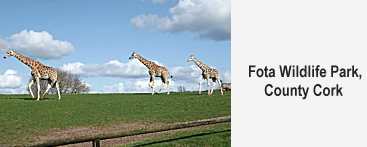
The education centre and Summer camps bring 13,000 students annually to the park so it is very much a working facility as well as Cork's premier tourist attraction that will greatly appeal to children of all ages. Cheetahs, bison, flamingos and lemurs - the park is a great way to experience animals close-up. You can find out more at: http://www.fotawildlife.ie The park is located nearby scenic Cobh with its Titanic exhibit as well as Cork city with its easy access to all that the County has to offer including Blarney Castle, Bantry House and Gardens, Jameson Heritage Centre, The West Cork Model Railway Village and much more. |
KEEP THIS NEWSLETTER ALIVE!
Solve your gift problem at: https://www.irishnation.com

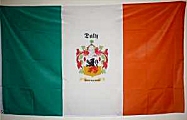
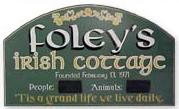
|
=========================== THE OUTSIDER by Michael Collins =========================== The morning air had a quality only found on an island: cool yet warmed by the rising sun and the rocks still giving off yesterday's heat. The three men tramped up the gravel track, the slope steeper as they neared the western end of the island. The sun was diagonally behind them, low enough to pick out in detail every feature of this rough and ready place. To the left the light was reflected in a sparkle from the surrounding seas. Ahead the cliffs rose to breast the Atlantic. To the right the bulk of the island swelled steeply upwards like a whale's back, the sparse grass, rushes and heather pushing up between the rocky outcrops through the thin living layer, reminding all who passed that wresting an existence from this soil meant unceasing toil. The patient sheep grazed and bleated, wanting rid of their thick winter coats. 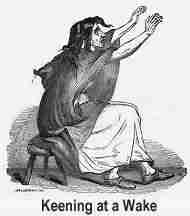
"And wasn't that a grand wake now, last evening?" asked Mick Mickey. More a statement than a question, in honour of the dead man and his family and to mark the fact that they had given old John a good send-off. Michael Gerry nodded assent. The Outsider recalled the previous evening. He had arrived on the island unannounced and had been offered lodgings at Mick Mickey's. At dusk they had tramped up this same path to where Old John had been laid out in his home. The cottage crouched under its thatch, pressing itself down, away from the gales crashing in from the Atlantic. A single-storey cottage, whitewashed on the outside and with a bright red door, surrounded by exotic fuchsias that seemed out of place in this land of greens, greys, blues. Old John had been laid out in his coffin, dressed in his Sunday suit, surrounded by candles. The eldest daughter, her mother long dead, had the responsibility for the wake – helped by the neighbours. They had seen to a plentiful supply of cake, tea, tobacco, whiskey... plus some arcane potions distilled locally without the intervention of the excise men. The women had been gathered round the bier. Theirs it was to wail and keen, joined at intervals by newly arrived men who would recite a decade of the rosary for the dead man's soul. The Outsider went in with Mick Mickey and did his best to participate. His contribution went no further than kneeling down, joining his hands and half-closing his eyes, while the Paters, Aves and Glorias buzzed around him like a swarm of bees, the high women's voices alternating with the men's grumbling throats as they prayed their relays with the skill born of many years' practice. A non-believer, he felt nothing for the ritual, but he could imagine that the repetitive drone of half-understood formulae could bring about a certain peace of mind, convince the participants that they were doing something meaningful, as the marathon runner must feel after passing the finishing line having taken fifty-thousand identical steps to get there. Once they had done their duty the men retired, leaving eternity's business to their womenfolk. They gathered in the kitchen, the air thick with tobacco smoke and the fumes of alcohol. This was the socially important part of the ceremony, where Old John would be set into the minds of the surviving islanders. The Outsider observed quietly, marvelling at this rich collection of individuals. Not that these people were rich in terms of money: they simply had a richness about them. They smelt rich, felt rich, sounded rich, moved richly. His own people at home smelt... well, they smelt too, but the smell usually came out of a bottle. These people smelt warm, like contented cows. The people at home felt and looked rich on the outside: soft clothing, soft skins, warm handshakes. Here they looked solid, little regard for clothing except as protection against the elements, skin like the bark of an oak, grooved and greyish-brown. And they were sparse in their rich touching – perhaps no more than a handshake from a calloused hand. Here an arm around your shoulders was like being included in the honours list. The people back home moved like the White Rabbit continually glancing at his watch. Here they moved richly, slowly and ponderously, counting each step, measuring effort required and advantage gained. Watches and clocks were scarce. Their speech was rich and colourful. Sure, he was a grand man, was Old John. Sure, he was indeed. You would have thought that Bridie's death would have finished him off. You would, too. Not John. He knew what was what. He was made of stern stuff. Well, you may be right, but surely to God he knew little about sheep. That's no surprise. He had the cows. He had but three cows, to be sure. Aye, but he knew them. And he had the best grassland. And he knew about vegetables, sure he did. Now what use is vegetables? A man needs good red meat to keep him on his feet. And the Guinness! To knock him off his feet, more likely. Aye, but John knew all about that too. Sure, didn't he need five pints before that recitation of his? You can talk, Mick Mickey. We don't get a peep out of you till you've chalked up ten pints. Ach, but Old John could hold his drink a treat. And he knew when to hold off, so he did. So you didn't see him when young John came back from Australia? Sure, I did. He was still in O'Brien's at six the next morning! Ach, a father needs to celebrate at a time like that, sure he does. Aye, that's true enough. And Old John was never one to throw good money away on drink. Sure he wasn't! Never known to pay for the last round! The to-and-fro remarks were punctuated, sometimes by laughter but mostly by deep silences and quiet guffaws, back of the hand against the mouth. The men were re-telling John's life story. As they remembered him. The Outsider had nothing to contribute except his respectful presence. Despite his fairly frequent visits to the island he had not known Old John except by name. Now his contribution consisted, once again and for the umpteenth time, in a sense of wonder at how this tiny isolated society had managed to continue to exist with its unspoken and unwritten customs intact, its uniqueness untouched. He listened as the remarks and quips flew across the room. This was neither eulogy nor condemnation. It was the beginning of an oral tradition that would immortalise Old John for as long as people lived here. It had been late when they left the wake. Michael Gerry had accompanied Mick Mickey and the Outsider home, weaving a familiar path down to the sea-level northeast end of the island. They had passed Michael Joe's cottage, and the Outsider had thought he recognised a few places where Michael Joe had extracted lethal bottles of home-brewed liquor from the bog the previous summer, all the while conducting a discussion on the rival merits of Plato, Aristotle and Sartre, and any philosophers in between. By now, thought the Outsider, this island has no more surprises for me. He was wrong. 
The three of them had covered the last mile in silence. As they neared Old John's cottage the coffin was being carried out on broad shoulders, over the spine of the island to the church and graveyard. Nobody hurried. There was no traffic. A few people working in the fields uncovered their heads, stood still until the procession had passed and then resumed work. Or laid down their implements and joined the procession. The church was full, most of the congregation unknown to the Outsider. The Requiem Mass was standard, the kind of ceremony you would get anywhere in the world. The Outsider found it incomprehensible, even more so than the rosary of the previous evening and far less significant than the exchanges between the men in Old John's cottage. He disliked it. He looked around for the face he hoped he knew best. The face was absent. The Outsider was on the back row of the benches in the tiny church. When the service ended he was first out. He found the face he had been looking for: Michael Joe, sitting on the ground with his back against a dry stone wall, puffing at his pipe, disreputable hat on his head, eager panting dog with lolling tongue at his feet, bicycle propped next to him against the wall. 
"Were you not inside, Michael Joe?" asked the Outsider. "I was not. Sure it's better out here. You can hear it all drone on and know where they're up to – gives you a chance to light the old pipe at strategic times – but you don't have to listen because you've heard it all before. And it gets no better. Anyway, out here I have the dog and the pipe and the rest of the universe around me. That gives me more cause to contemplate life and death than the words of our beloved parish priest, no matter how well-intentioned he may be." The men gathered round in a loose circle and lit up cigarettes and pipes. The women stayed behind at the church door in a clump, quietly whispering among themselves. Michael Gerry and another of the young men, Michael Bob, took centre stage as if on a signal, doffed their jackets, spat on their hands and started to dig. It dawned on the Outsider that for the purposes of burial the two men were the gravediggers. And how the devil will they do that here? he asked himself. The island is a lump of solid rock. You'd need dynamite to dig a grave. But he had still more to learn. Though the church was built on rocky foundations its tiny graveyard easily yielded to the combined spades. When the two lads were about three feet down they slowed their pace and began to dig carefully. The reason soon became apparent: they were unearthing human bones. These were laid with a fair degree of reverence and care – and in comparative silence – on top of Old John's coffin, until a skull came to light. - Would you look at that now? - Sure an' all, it must be old Padraig. - D'you think so? - Och, it must be. He's been gone now all of... - Must be eighty years. - Well, he'll be having another burial today. Not everybody can do it twice... And the discussions continued quietly until the hole was deep and wide and long enough for Old John. Then – a signal the Outsider missed – the women filed out of the church and ranged themselves with the men around the grave. The coffin was lowered, Old John's remains on their first step towards slowly becoming one with the foundations of the ancient island. The unearthed bones were carefully returned and the soil and rocks shovelled over them. The congregation remained awhile, heads bowed. Men took off their hats and caps. Praying? The Outsider was not. He was quietly and – he hoped – unobtrusively observing. So was Michael Joe, still wearing his disreputable hat, smoking his pipe but making no effort to be unobtrusive. The observer, the recorder of otherwise unrecorded history. At a second imperceptible signal, like a cloud of starlings wheeling with perfect precision, the congregation turned and began, in ones and twos, to exit from the graveyard. "Coming?" asked Mick Mickey. "Where to?" asked the Outsider. "The pub." There was the long trek downhill to the harbourside pub and the comfort of the foaming pints. There had been two observers there that day. Michael Joe and the Outsider. Michael Joe stored it for the island's history. The Outsider was not sure what to make of it. But he stored it too. |
KEEP THIS NEWSLETTER ALIVE!

Get Your Family Crest Flag at:
https://www.irishnation.com/familycrestflags.htm
|
=========================================================== DANIEL O'CONNELL - THE LIFE AND TIMES OF THE LIBERATOR 1775 - 1847 by Anthony Lynott =========================================================== Daniel O'Connell, affectionately known as The Liberator or The Emancipator was an Irish political activist. His activism and many accomplishments spanned a period of almost 50 years beginning in the latter part of the 18th century. He would be mostly known for his campaign for, and achievement of, Catholic Emancipation, followed by his unsuccessful campaign for the repeal of the Act of Union that formed the Union of Great Britain and Ireland. 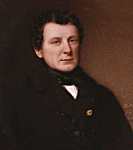
O'Connell was born August 6, 1775 at Carhen near Cahirciveen, County Kerry to Morgan and Catherine O'Connell of Derrynane. At one time a wealthy landed family, the O'Connell's could trace their chieftain roots back to the 14th century. Named after his Uncle Daniel he came into the world of the Protestant Ascendancy where the political, economic, and social domination of Ireland was held by a minority of large landowners, Protestant clergy and professionals that were mostly members of the State Churches of Ireland and England. Growing up, O'Connell as a Catholic would not enjoy the political and social privileges of the Ascendancy, which excluded Roman Catholics as well as other non-conforming religions. Instead he was raised amongst the Irish peasantry, learning the Irish language and seeing first-hand the hardships under which most of the peasantry laboured. His ability to speak Irish, along with his interest in the traditional Kerry culture of Irish song and story, as well as his understanding of how the rural mind worked would shape his personality and core beliefs going forward. 
At the time of Daniel's birth his Uncle Maurice, thirteen years older than his brother Morgan, had authority over his siblings as was custom at the time. This was to have a significant impact on the development of young Daniel, starting off with Maurice's position, along with Morgan's, that Daniel should be fostered out in accordance with Gaelic tradition. The notion of fosterage was to ensure that Daniel would gain a solid understanding of the peasantry, both with their language and their way of life. So, young Daniel was fostered out in infancy to the Cahill family, the family of Morgan's head Cowman, returning to his birth parents and his four siblings (eventually growing to nine) at the age of five. The Cahill's lived only five miles from the O'Connell's, and during this period Daniel spoke only Irish and, by all accounts, formed a strong bond with his foster parents while retaining a strong attachment to his birth parents. While still in his childhood Daniel was adopted, along with his brother, by his childless uncle Maurice, who lived at Derrynane House in nearby Caherdaniel, County Kerry. This arrangement would bode well for Daniel given Maurice's established wealth that would provide Daniel with considerable opportunities that otherwise would not be available. He would spend much of his early life with Maurice, starting on the road of matriculation at a small boarding school near Cork. He would later attend Saint-Omer (1791–1792) and Douai (1792–1793), reportedly two of the best Catholic schools in France. During this period O'Connell was exposed to the French Revolution and its violent radical social and political upheaval, which left him with a revulsion of violence for political pursuits. In 1794 O'Connell enrolled in Lincoln's Inn, London to study law (Irishmen who wished to practice as barristers were required to attend the Inns of Court in London). Initially, his studies were concentrated on the legal and political history of Ireland, expanding to the philosophers of Voltaire and Rousseau, and the works of Godwin, Smith, and Bentham; he became painfully aware of the prevailing repression of the populace by the government and its goal to maintain the Ascendancy of a privileged and, oftentimes, corrupt minority, all shaping O'Connell's own radical (for the times) philosophy as a Nationalist. Continuing his studies two years later, he transferred to the King's Inns, Dublin, the institution which controls the entry of barristers-at-law into the justice system of Ireland; he was subsequently called to the bar in 1798. O'Connell accomplished much in his relatively short lifetime. However, the first ten years or so of his career were fairly uneventful where he focused on his private law practice; it was also during this period that he secretly married his cousin Mary, by all accounts a good marriage that produced twelve children. His career started to expand into politics with his public opposition to the Act of Union in 1800. Nevertheless, his primary activities were focused on Catholic Emancipation, advancing the movement to repeal the legislation disenfranchising most Catholics. He would regularly attend the meetings of the Catholic Board that he established, applying and infusing his famous energy into its proceedings, and by 1810 he would become the most trusted and powerful of the Catholic leaders. And it was during his time on the Board that one noted event happened that endeared him further with the people of Ireland: The Dublin Corporation (city council), supporter of the Protestant ascendancy, was memorably described by O'Connell in a public speech in 1815 as a "beggarly corporation". The aldermen and councillors were enraged and, finding that O'Connell would not apologize, a member of the Corporation, John D'Esterre, challenged O'Connell to a duel. D'Esterre was an accomplished duellist, and the hope was that if O'Connell attempted to fight there would be an end to his career. To the surprise of all O'Connell won the duel, but to his final days he never missed an opportunity of assisting the D'Esterre family. Dublin Castle, the seat of British power in Ireland, afraid of the growing profile of the Catholic Board, and under the auspices of the Convention act of 1793, arrested and brought to trial some of the Catholic Board's leaders. O'Connell successfully defended the accused and obtained an acquittal. In time the Board was dissolved, replaced by the Catholic Association co-founded by O'Connell in 1823. The mission of the Association was to achieve Catholic Emancipation, and by 1825 it had organized itself throughout most of the island as a formidable political movement. In most districts there was a branch of the Catholic Association, where local grievances were addressed, and subscriptions (aka rents) collected and sent to the Dublin headquarters. The subscriptions facilitated the growth of a significant treasury that would finance the Association's many activities. Growing alarmed at the increasing power of the Association, in 1825 the Government passed a bill suppressing it. But O'Connell simply reconstituted the Association and the work continued. In 1826 the Association successfully fielded a Westminster candidate (a Protestant Emancipationist) for Waterford who defeated a powerful member of the Ascendancy (a significant electoral test). The Association would go on to achieve similar victories in Counties Monaghan, Westmeath, Cavan and Louth. 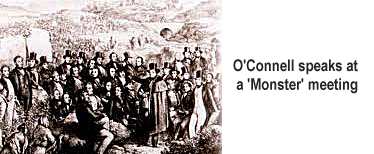
Similarly, in 1828 a by-election was called in Co. Clare…….O'Connell contested the seat himself (the first Catholic to seek office in Westminster) and achieved a decisive victory for the Catholic cause. However, going on to Westminster to take his seat, and obliged as a Catholic to refuse to take the required Oath of Supremacy, he was refused entry. Fearing a serious backlash though, the British Government passed the Roman Catholic Relief Act (1829) which granted Catholic Emancipation. Catholics were now to be admitted to parliament and to public offices, but the Ascendancy still controlled Dublin castle, and Catholics were still kept out of most public positions. The Act, in fact, meant very little to the ordinary peasantry but it was still a major step forward in Irish history as Catholic candidates could be elected to represent their own constituents. This enabled O'Connell to take his seat as representative for Kerry in 1830. O'Connell quickly established himself as Ireland's unequalled political leader in the House of Commons, becoming leader of the Irish Members of Parliament. Noting that historian Roy Foster has termed his energy as protean, O'Connell pursued his goals with a ferocious tenacity. He was active in the campaigns for parliamentary, legal, and prison reform, electoral reform and the secret ballot, free trade, the abolition of slavery and Jewish emancipation. But his prime objective was now the Repeal of the Act of Union. This was to be facilitated through The National Association of Ireland, known as the Repeal Association. The Association included many Young Irelanders, a parallel political movement who, unlike O'Connell, believed that independence could be won only by use of force. O'Connell now began to organise “monster meetings” throughout the country. The first was at Trim, Co. Meath which attracted a crowd of over 100,000, later increasing to crowds of more than 750,000 when people gathered on the hill of Tara to hear his eloquent oratory. The government became alarmed at the strength of the Repeal Movement and a monster meeting which O'Connell had planned for 8 October 1843 in Clontarf, Dublin was banned. Huge crowds were already on their way when O'Connell called off the meeting to avoid the risk of violence and bloodshed. Nevertheless, he was charged with conspiracy, arrested and sentenced to a year in jail and a fine of £2,000. O'Connell was released after serving three months in prison, much weakened physically by his ordeal. While he continued with his campaign for repeal it was clear that the tactics that had won emancipation had failed with his Repeal movement. O'Connell, now seventy and in ill health, no longer had a viable plan for future action. Moreover, morale was waning in the Repeal Association and the Young Irelanders withdrew. Concluding that he had failed with his goal, O'Connell gave up his fight for repeal. In 1847 he made his last speech in Parliament, pleading in his most passionate manner for aid so that his people would not perish from the great famine that was now in its second year. i It is the case that O'Connell established the template of agitation and the pursuit of political goals through constitutional means as opposed to violent means, keeping strictly within the law. This is an accomplishment in itself given his singular ability to mobilize monster meetings of huge crowds that would undoubtedly have followed O'Connell on a violent path if asked to do so. Future major world political leaders would follow his example. Still in his seventieth year O'Connell was advised to move to a warmer climate to repair his ailing health. Planning on a pilgrimage to Rome he stopped off in Paris where he was greeted by a large crowd of radicals who regarded him as the “most successful champion of liberty and democracy in Europe”. He did not complete his journey to Rome though; he died in Genoa on 15 May 1847. As he had requested, O'Connell's heart was buried in the Irish College in Rome and his body was interred in Glasnevin cemetery in Dublin on 5 August 1847. MAJOR LIFE EVENTS: 6 August 1775: Born in Cahirciveen, County Kerry 19 May 1798: Called to the Irish Bar 13 January 1800: Speech delivered opposing Act of Union 1811: Catholic Board established 1814: Catholic Board dissolved 1 February 1815: Duel with D'Esterre 1821: Makes emancipation presentation to George IV 13 May 1823: Establishes the Catholic Association February 1823: Inherits Derrynane House 5 July 1828: Wins Clare seat for MP 13 April 1829: Catholic Emancipation Act passes 1 November 1841: Becomes first Catholic Lord Mayor of Dublin 15 August 1843: Tara 'Monster' meeting 7 October 1843: Clontarf 'Monster' meeting banned 30 May 1844: Imprisoned 5 September 1844: Released from prison 8 February 1847: Last speech in the House of Commons 15 May 1847: Dies in Genoa, Italy Bibliography Christine Kineady. UCC: Multitext Project in Irish History / Emancipation, Famine & Religion: Ireland under the Union Clare County Library. 'Clare People: Daniel O'Connell (1775- 1847).' Clare County Library (n.d.): 1 - 3. Foster, R. F. Modern Ireland 1600 - 1972. London: Penguin, 1988. Jackson, Alvin. Ireland 1798 - 1998. West Sussex - UK: John Wiley & Sons Ltd., 1999. Robert Dunlap, M.A. Daniel O'Connell. New York: Fred DeFau & Company, 1899. Electronic Book. The Warrington Project / The Institute of Irish Studies, The University of Liverpool. 'Catholic Emancipation & the role of Daniel O'Connell.' Understanding Anglo-Irish relations (n.d.): 18. |
KEEP THIS NEWSLETTER ALIVE!
Get Your Family Crest Signet Ring at:

==============================
YOUTUBE VIDEOS OF IRISH INTEREST
==============================
You can view our archive of Videos of Irish interest here:
https://www.ireland-information.com/irishvideos.htm
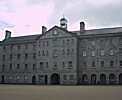
Collins Barracks, Dublin
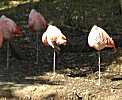
Fota Wildlife Park, Cork
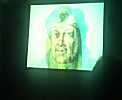
Daniel O'Connell - The Final Years
==========================
CLAN GATHERING NOTICEBOARD
==========================
O'Mahonys in Australia
The O'Mahony Clan will hold a Get-Together on Saturday
12 January 2013 at Irish Murphys, 21 Salamanca Place,
Hobart, Tasmania, Australia from 12 noon. Speakers
include John O'Mahony from Galway, Ireland who will
speak on the 'Famine, 160 Years On '. Convict history
of the Clan will be discussed . For further information
contact Greg Mahony, 74/139 Pring Street, Hendra,
Queensland 4011, Australia or email mahonygreg@yahoo.com.au
===========================
GAELIC PHRASES OF THE MONTH
===========================
PHRASE: Ni h-e la na baisti la na bpaisti
PRONOUNCED: nee hay law na bawshtee law na bawshtee
MEANING: A rainy day isn't a day for the children
PHRASE: Is e do bhaile do chaislean
PRONOUNCED: iss ay duh vol-yah duh cosh-lawn
MEANING: Your house is your castle
PHRASE: Tir gan teanga, tir gan anam
PRONOUNCED: teer gon tyong-ga, teer gon on-umm
MEANING: A country (land) without a language, a country without a soul
View the archive of phrases here:
https://www.ireland-information.com/irishphrases.htm
==================
COMPETITION RESULT
==================
The winner was: d_roache@xtra.co.nz
who will receive the following:
A Single Family Crest Print
(US$19.99 value)

Send us an email to claim your print, and well done!
Remember that all subscribers to this
newsletter are automatically entered into the
competition every time.
I hope that you have enjoyed this issue.
Until next month,

Michael Green,
Editor,
The Information about Ireland Site.
https://www.ireland-information.com
Click here to contact us
KEEP THIS NEWSLETTER ALIVE! Visit https://www.irishnation.com